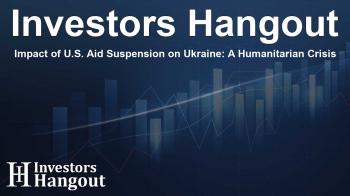Impact of U.S. Aid Suspension on Ukraine: A Humanitarian Crisis

Impact of U.S. Aid Suspension on Ukraine's Humanitarian Crisis
Action Against Hunger confirmed that the U.S. government's pause on international aid has severely affected humanitarian efforts in the region. This critical loss means that vital cash distribution to families displaced near the front lines has come to a halt. With around nine million Ukrainians living in poverty, this situation is dire.
Rising Challenges for Displaced Families
Currently, an alarming 12.7 million individuals, representing about 40% of Ukraine's population, depend on humanitarian assistance to survive. The suspension of aid comes at a time when humanitarian operations were already struggling with limited resources. Approximately 20,000 people living in high-risk zones now face grim realities due to funding cuts.
Healthcare Access Under Threat
According to Ionu? Raita, Director of Action Against Hunger in Ukraine, the suspension has drastically limited healthcare availability for 18,000 people in remote and precarious situations. Interruptions in psychological support sessions for traumatized children have also occurred, and around 1,800 vulnerable individuals may lose essential financial aid for their basic needs.
The Scale of Displacement
Ukraine is grappling with an unprecedented displacement crisis, with 6.8 million people having fled to safety and an additional 3.6 million internally displaced since the onset of the war. The majority of these displaced individuals have relied solely on humanitarian food assistance for over a year, yet they are finding it increasingly difficult to establish sustainable living arrangements.
Challenges in Finding Shelter
As Russian forces advanced in late 2024, more than 200,000 people had to evacuate their homes. The search for housing has become increasingly difficult, leaving many families vulnerable and without support. The destruction of agricultural lands and industrial facilities, combined with business closures, has pushed the unemployment rate in frontline regions to a staggering 22%. With rising prices and loss of income, many face intense food insecurity.
Healthcare Services Disrupted
Access to healthcare in Ukraine has suffered significantly due to ongoing conflict. Health infrastructure has been repeatedly targeted, resulting in a shortage of both medicines and healthcare personnel. To combat these challenges, Action Against Hunger has deployed mobile health teams across the Dnipro and Kharkiv regions. These teams consist of healthcare professionals who provide essential medical services to the most vulnerable populations.
The Mental Health Crisis
As airstrikes continue to threaten safety, mental health issues have skyrocketed. It is estimated that around ten million individuals may experience mental health disorders in the coming months. This situation is especially concerning for children, many of whom have missed four years of formal education due to the ongoing crisis and the previous pandemic.
Support and Recovery Efforts
During these unprecedented times, Action Against Hunger has remained committed to helping the people of Ukraine since March 2022, focusing their efforts primarily in the eastern regions of the country. In 2023 alone, they provided assistance to approximately 675,364 individuals, addressing pressing needs in health, mental health, sanitation, food security, and livelihoods.
Psychosocial Support Initiatives
The organization has prioritized psychosocial support to assist those suffering from stress and trauma, reaching over 12,457 people in 2023. This is a testament to their dedication to addressing the urgent needs of those impacted by the war.
Frequently Asked Questions
What are the main effects of the U.S. aid suspension on Ukraine?
The suspension has led to critical disruptions in cash distribution and healthcare services, worsening the humanitarian crisis for millions.
How many people in Ukraine depend on humanitarian aid?
An estimated 12.7 million people, or 40% of the population, rely on humanitarian assistance to survive.
What challenges do displaced families face in Ukraine?
Displaced families struggle to find housing and face significant food insecurity exacerbated by high unemployment and rising prices.
How is mental health being affected by the ongoing crisis?
Millions are at risk of mental health disorders due to the trauma from the conflict and disruptions in education for children.
What efforts are being made by Action Against Hunger?
Action Against Hunger provides essential services, including mobile health care and psychosocial support, to those most affected by the crisis.
About The Author
Contact Kelly Martin privately here. Or send an email with ATTN: Kelly Martin as the subject to contact@investorshangout.com.
About Investors Hangout
Investors Hangout is a leading online stock forum for financial discussion and learning, offering a wide range of free tools and resources. It draws in traders of all levels, who exchange market knowledge, investigate trading tactics, and keep an eye on industry developments in real time. Featuring financial articles, stock message boards, quotes, charts, company profiles, and live news updates. Through cooperative learning and a wealth of informational resources, it helps users from novices creating their first portfolios to experts honing their techniques. Join Investors Hangout today: https://investorshangout.com/
The content of this article is based on factual, publicly available information and does not represent legal, financial, or investment advice. Investors Hangout does not offer financial advice, and the author is not a licensed financial advisor. Consult a qualified advisor before making any financial or investment decisions based on this article. This article should not be considered advice to purchase, sell, or hold any securities or other investments. If any of the material provided here is inaccurate, please contact us for corrections.

